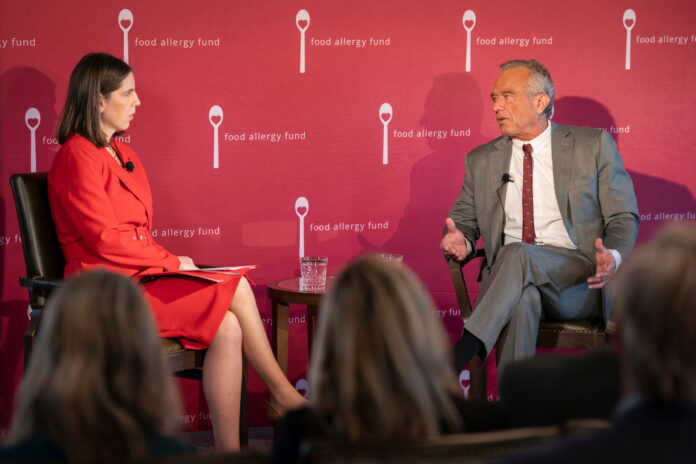WASHINGTON, D.C. — Senior leaders from major federal health agencies convened in Washington today for the Food Allergy Fund (FAF) Leadership Forum, highlighting an unprecedented commitment to addressing the food allergy crisis impacting 1 in 13 children and 1 in 10 adults across the United States. The event brought together leaders from government, academia, industry, and philanthropy for high-level discussions on advancing prevention, treatment, and cures for food allergies.
HHS Secretary Robert F. Kennedy Jr., NIH Director Dr. Jay Bhattacharya, FDA Commissioner Dr. Marty Makary, and ARPA-H Director Dr. Alicia Jackson delivered keynote remarks that signaled a renewed national focus on food allergies as a major public health priority. The forum underscored a unified commitment across federal agencies to tackle what they described as an overlooked health crisis.
“Under my leadership, HHS is making it a top priority to uncover the root causes of food allergies,” said Secretary Kennedy. “Thanks to President Trump’s leadership and his Make America Healthy Again vision, we’re confronting the childhood chronic disease epidemic at its source — restoring the health of our children and the nation.”
Dr. Bhattacharya emphasized the NIH’s commitment to nutritional science as a cornerstone of its mission, while Dr. Makary reaffirmed the FDA’s focus on ensuring patient safety and advancing evidence-based treatments. FAF Founder and CEO Ilana Golant, herself a food allergy parent and adult-onset allergy patient, called the level of federal engagement a vital turning point.
“Food allergies remain one of the most overlooked and underfunded public-health challenges,” Golant said. “Also, they may be the canary in the coal mine for a broader immune-health crisis. By breaking down silos and uniting science, policy, and innovation, we can unlock solutions that reach far beyond food allergies.”
ARPA-H Director Dr. Alicia Jackson highlighted the agency’s growing commitment to supporting high-risk, high-reward research that could lead to game-changing breakthroughs.
“ARPA-H exists for one purpose: to take on the challenges that are too big, too complex, and too high-risk for traditional funding or industry,” Jackson said. “We are calling on the best researchers, entrepreneurs and leaders to send us their brightest minds with the passion, expertise and ideas that can create a future where preventing and eliminating food allergies is fully possible.”
The event featured a panel of leading health-tech CEOs presenting next-generation innovations including AI-powered anaphylaxis detection wearables, novel immunotherapy delivery formats, and biologic treatments, all aimed at improving quality of life for patients and families affected by food allergies.
The Forum also marked the launch of the Food Allergy Fund’s Microbiome Collective, a multi-million-dollar collaboration bringing together top research institutions to explore the root causes of food allergies and related immune disorders. The initiative builds upon pivotal FAF-supported research, including a first-in-human trial at Boston Children’s Hospital where 40 percent of participants achieved up to a six-fold increase in peanut tolerance after a single microbiota transfer.
“FAF’s Collective model creates the scale and standardization needed to link specific microbiome mechanisms to disease, and, more importantly, to develop precision treatments,” said Dr. Rima Rachid, director of the Food Allergy Program at Boston Children’s Hospital.
Dr. Susan Lynch of the University of California San Francisco added, “How we understand and modulate the microbiome could transform how we prevent and treat a whole spectrum of inflammatory and autoimmune diseases.”
In the coming weeks, FAF will release a Request for Proposals to fund research projects focused on new diagnostics, treatments, and prevention strategies. Priority will be given to collaborative efforts with the potential for rapid translation into clinical practice.



